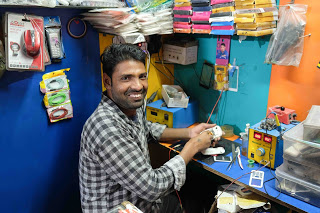“In the online world, a start-up that has a valuation of more than a billion dollars is referred to as a ‘unicorn’. Flipkart was a unicorn, Swiggy is one, Ola and Oyo have also joined the list of unicorns.
But, if you look at the larger Indian reality, what India really needs today are ‘nano unicorns’. People who will develop a skill and start a business in a tiny village or a taluka and in 12-18 months, this business will employ people on a part-time basis. So, the real economic progress will happen when India sees a surfeit of nano unicorns.” Subroto Bagchi, Chairman of Odisha Skill Development Authority
Worldwide, nano, micro and small enterprises have been the driving force behind the engine of economic growth and plays an important role in promoting equitable development, so desperately needed here in India. The sector is the second largest employer, after agriculture, and provides employment to around 120 million people in India.
It is little wonder then, that ACF’s Skilling Institutes (SEDI) has embraced entrepreneurship with full force and is now offering a full-fledged course to train both existing and future entrepreneurs. Leading the effort is Mahendra Patel, Senior Program Coordinator (SEDI) who has helped develop the entrepreneurship unit into a stand-alone course that is being piloted across 4 locations.
“SEDI has always promoted entrepreneurship as a key pathway for our trained youth to emerge out of poverty. But there was a need to bolster what we were doing and offer it as a separate course to more effectively meet the needs of aspiring entrepreneurs,” he said.
“Rural youth have a very good attitude for managing the struggle in a difficult situation – there is a resilience in them which is excellent for business. Additionally, rural youth have a good compass when it comes to rural consumption and rural services – what will work and what people want. However they have limited exposure on how to start and manage a business – our course helps with that.”
The exercise has not been easy, as the availability of trainers is a big challenge. “It's a very dynamic subject and one single person can’t train everyone on each topic,” Mahendra said.
With 30 topics being covered in the course, from ITC (Information, Communication, Technology) in Business to Business Communication and Market Survey & Analysis, there was a need to call in multiple experts to inject their expertise.
“These courses were not the core expertise of our existing trainers. We therefore brought in external trainers and guest lecturers to teach the programme” he said. In Gujarat for example, there is a Centre for Entrepreneurship Development – they have partnered with SEDI and they are supporting us to develop and provide training.”
But, whilst training is in SEDI’s control, there was a need to find a way to support and guide trainees post their training, and mentoring provided the perfect solution. “Mentoring is the most important aspect after the training programme. What is my next step now? Where do I go and how do I connect with the market? Where and how do I buy raw materials? How do I manage HR, Finance and statutory compliances? How do I maintain market quality standards? How to find my first customer? These are all questions in our students’ minds and our course aims to answer them,” said Mahendra.
As such, over 100 mentors have been engaged and they are helping in a very hands-on way with ‘real time’ issues that entrepreneurs face such as HR management, business planning, legal compliances, quality management.
“There is a diversity among mentors – some retired bankers and CAs, entrepreneurs who have developed their enterprise to a significant level - there are multiple types of people engaged as volunteers to support our graduates in the establishment and growth of their nano, micro and small enterprises,” he said.
The course is targeted at 2-3 types of entrepreneurs. “We are targeting existing nano or micro entrepreneurs who have started and are struggling with road blocks. We also find alumni who are interested in starting their own business after having worked for a while elsewhere. Of course another target is existing SEDI Trainees who are focused on starting their own enterprise.” Mahendra said.
And there are many opportunities according to Mahendra. “Agricultural based entrepreneurship is a huge opportunity in rural areas. Rural consumption is largely provided by entrepreneurs from outside and rural youth deeply understand the rural community and behavioural aspects – their living styles, thought process, their requirements. They make good future entrepreneurs.” he said.
The results have been promising with 174 candidates trained to date. Mrs Tikuben Prajapati is one such graduate of the course who has become a serial entrepreneur. Having studied Assistant Beauty Therapist at SEDI in 2019, she opened her own Beauty Parlour in 2019 which was operating successfully. She enrolled in the Entrepreneurship Course and on completion started a second business, Shreeji Ladies Tailors & Stores – earning Rs. 30,000 per month to support her family of 4.
Currently the programme has expanded to 9 locations and will scale to 30 locations in 2022-23, supported by a detailed plan for expansion.
“Our aim is to educate and support 10,000 entrepreneurs in kickstarting their own enterprise in the next 4 years. To date, we have an almost 80% success rate, whereby our graduates are successful in starting and expanding their enterprise post our training,” he said.





 (2).png)
.png)

0 Comment